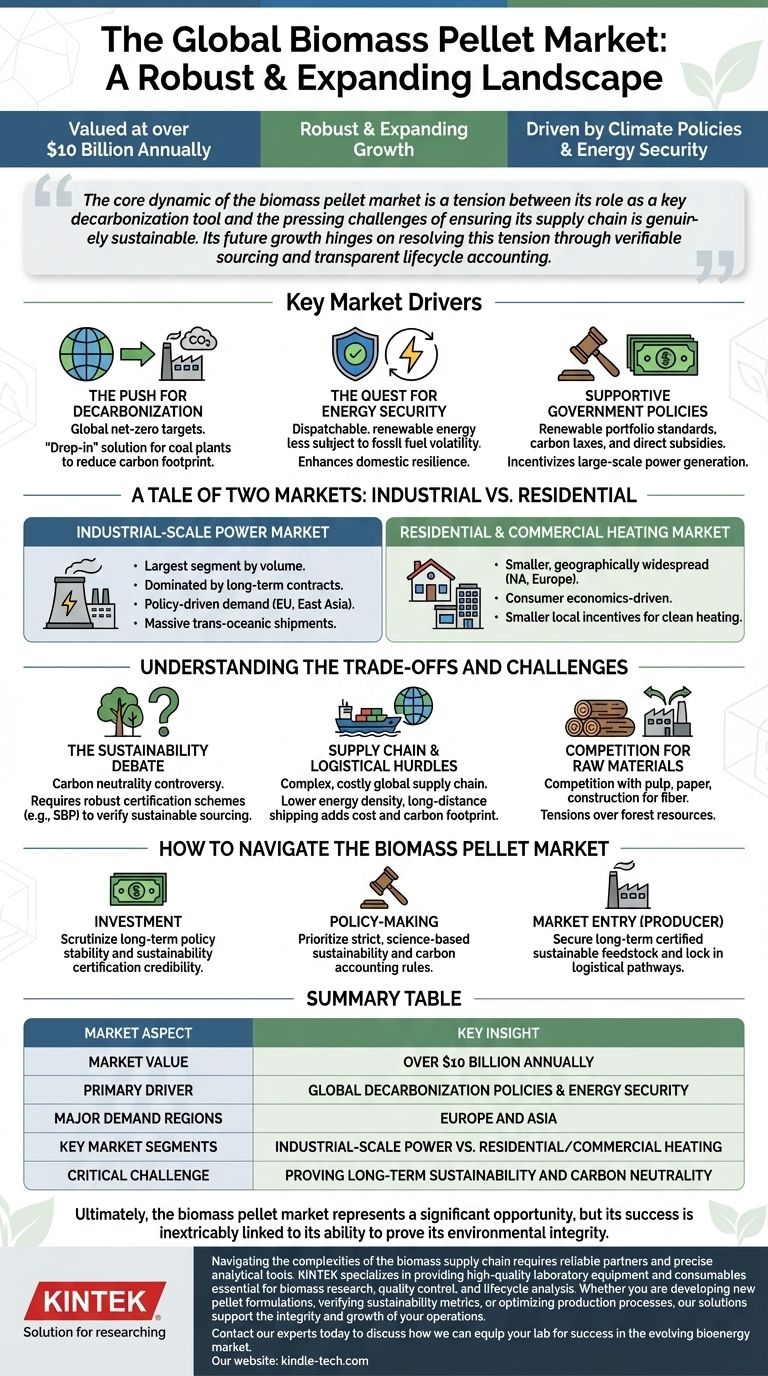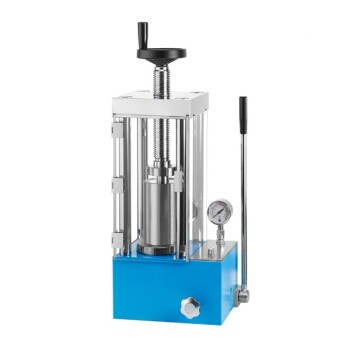In short, the global market for biomass pellets is robust and expanding, driven primarily by international climate policies and the pursuit of energy security. Valued at over $10 billion annually, the market is projected to experience significant growth as nations transition away from coal and seek renewable energy sources for power generation and heating. The largest demand centers are in Europe and Asia, supplied by major producers in North America and Eastern Europe.
The core dynamic of the biomass pellet market is a tension between its role as a key decarbonization tool and the pressing challenges of ensuring its supply chain is genuinely sustainable. Its future growth hinges on resolving this tension through verifiable sourcing and transparent lifecycle accounting.

The Key Market Drivers
The expansion of the biomass pellet market is not accidental; it's the result of powerful global trends and specific policy actions. Understanding these drivers is essential to grasping the market's long-term trajectory.
The Push for Decarbonization
The primary engine of the industrial pellet market is the global effort to reduce greenhouse gas emissions. Many countries have set ambitious net-zero targets.
Biomass pellets offer a "drop-in" solution for coal-fired power plants. By converting or "co-firing" with pellets, utilities can significantly reduce their reported carbon footprint without building entirely new infrastructure.
The Quest for Energy Security
Geopolitical instability and volatile fossil fuel prices have forced nations to prioritize energy security. Pellets provide a source of dispatchable, renewable energy that is less subject to the price shocks of the global oil and gas markets.
By diversifying their energy mix with biomass, countries can reduce their reliance on a small number of energy exporters and enhance their domestic energy resilience.
Supportive Government Policies
The market is heavily influenced by government intervention. Policies like renewable portfolio standards, carbon taxes, and direct subsidies make biomass economically competitive with fossil fuels.
For example, the United Kingdom, the Netherlands, Denmark, Japan, and South Korea have all implemented frameworks that incentivize the use of biomass for large-scale power generation, creating massive demand hubs.
A Tale of Two Markets: Industrial vs. Residential
The global pellet market is not monolithic. It is sharply divided into two distinct segments with different drivers, scales, and logistics.
The Industrial-Scale Power Market
This is the largest segment by volume, dominated by long-term contracts between large-scale producers and utility companies. It relies on massive trans-oceanic shipments of wood pellets.
The key consumers are large power stations in Europe and East Asia. The demand is almost entirely policy-driven, aiming to meet national renewable energy targets.
The Residential & Commercial Heating Market
This market is smaller in scale but geographically more widespread, particularly in North America and Europe. It serves individual homes, schools, and commercial buildings.
Demand here is driven more by consumer economics—the price of pellets versus heating oil or natural gas—and smaller local or regional incentives for clean heating.
Understanding the Trade-offs and Challenges
While the growth outlook is strong, the biomass pellet industry faces significant scrutiny and several critical challenges that will define its future.
The Sustainability Debate
The central controversy is whether burning wood pellets is truly carbon neutral. Critics argue that when the entire lifecycle is considered—harvesting, processing, transportation, and the time it takes for forests to regrow—the emissions can be substantial.
The industry's response has been the development of robust sustainability certification schemes, like the Sustainable Biomass Program (SBP), to verify that pellets are sourced from sustainably managed forests and have a verifiable greenhouse gas benefit.
Supply Chain and Logistical Hurdles
Biomass pellets have a lower energy density than coal, and their production is geographically concentrated. This creates a complex and costly global supply chain.
Shipping millions of tons of pellets from North America to Europe or Asia adds significant cost and a non-trivial carbon footprint, which can erode the environmental benefits. Price volatility in shipping can also impact project economics.
Competition for Raw Materials
The wood fiber used for pellets is also a valuable input for other industries, including pulp and paper, panelboard, and construction.
This competition for feedstock can drive up raw material prices and create tension over forest resources, making it critical for producers to secure long-term, stable access to sustainable fiber.
How to Navigate the Biomass Pellet Market
Your approach to this market should be guided by your specific goals. The opportunities and risks look different depending on your role.
- If your primary focus is investment: Look beyond market growth projections and scrutinize the long-term stability of government support policies and the credibility of a producer's sustainability certifications.
- If your primary focus is policy-making: Prioritize the implementation of strict, science-based sustainability and carbon accounting rules to ensure that biomass subsidies deliver genuine climate benefits.
- If your primary focus is market entry as a producer: Secure a long-term, certified sustainable feedstock supply and lock in logistical pathways before committing capital, as these are the two biggest operational risks.
Ultimately, the biomass pellet market represents a significant opportunity, but its success is inextricably linked to its ability to prove its environmental integrity.
Summary Table:
| Market Aspect | Key Insight |
|---|---|
| Market Value | Over $10 billion annually |
| Primary Driver | Global decarbonization policies & energy security |
| Major Demand Regions | Europe and Asia |
| Key Market Segments | Industrial-scale power vs. Residential/commercial heating |
| Critical Challenge | Proving long-term sustainability and carbon neutrality |
Navigating the complexities of the biomass supply chain requires reliable partners and precise analytical tools. KINTEK specializes in providing high-quality laboratory equipment and consumables essential for biomass research, quality control, and lifecycle analysis. Whether you are developing new pellet formulations, verifying sustainability metrics, or optimizing production processes, our solutions support the integrity and growth of your operations. Contact our experts today to discuss how we can equip your lab for success in the evolving bioenergy market.
Visual Guide

Related Products
- XRF & KBR steel ring lab Powder Pellet Pressing Mold for FTIR
- kbr pellet press 2t
- Laboratory Manual Hydraulic Pellet Press for Lab Use
- Laboratory Manual Hydraulic Pellet Press for Lab Use
- Customizable PEM Electrolysis Cells for Diverse Research Applications
People Also Ask
- What is the role of sintering? Transform Powder into Durable, Complex Parts
- What is the purpose of the annealing step? Achieve Stability in DNA Amplification & Material Properties
- What is the function of a high-rate laboratory oven in CoCeBa catalyst preparation? Ensure Precursor Stability
- Are carbon nanotubes safe to use? Understanding the Critical Difference Between Bound and Free CNTs
- How are electron beams made? From Thermionic to Field Emission Explained
- What is the significance of a high-shear homogenizer in membrane preparation? Ensure Superior Casting Performance
- What are the 3 stages of heat treatment? Master Heating, Soaking & Cooling for Superior Material Properties
- How much more efficient are electric arc furnaces? Achieve 90% Energy Savings in Steel Production









